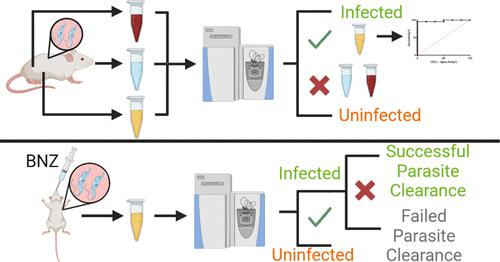当前位置:
X-MOL 学术
›
ACS Infect. Dis.
›
论文详情
Our official English website, www.x-mol.net, welcomes your
feedback! (Note: you will need to create a separate account there.)
Persistent Biofluid Small-Molecule Alterations Induced by Trypanosoma cruzi Infection Are Not Restored by Parasite Elimination
ACS Infectious Diseases ( IF 4.0 ) Pub Date : 2023-10-26 , DOI: 10.1021/acsinfecdis.3c00261 Danya A Dean 1, 2 , Jarrod Roach 1 , Rebecca Ulrich vonBargen 3 , Yi Xiong 4 , Shelley S Kane 1, 2 , London Klechka 5 , Kate Wheeler 5 , Michael Jimenez Sandoval 6 , Mahbobeh Lesani 4 , Ekram Hossain 1, 2 , Mitchelle Katemauswa 1, 2 , Miranda Schaefer 1 , Morgan Harris 1 , Sayre Barron 1 , Zongyuan Liu 1, 2 , Chongle Pan 4 , Laura-Isobel McCall 1, 2, 4
ACS Infectious Diseases ( IF 4.0 ) Pub Date : 2023-10-26 , DOI: 10.1021/acsinfecdis.3c00261 Danya A Dean 1, 2 , Jarrod Roach 1 , Rebecca Ulrich vonBargen 3 , Yi Xiong 4 , Shelley S Kane 1, 2 , London Klechka 5 , Kate Wheeler 5 , Michael Jimenez Sandoval 6 , Mahbobeh Lesani 4 , Ekram Hossain 1, 2 , Mitchelle Katemauswa 1, 2 , Miranda Schaefer 1 , Morgan Harris 1 , Sayre Barron 1 , Zongyuan Liu 1, 2 , Chongle Pan 4 , Laura-Isobel McCall 1, 2, 4
Affiliation

|
Chagas disease (CD), caused by Trypanosoma cruzi (T. cruzi) protozoa, is a complicated parasitic illness with inadequate medical measures for diagnosing infection and monitoring treatment success. To address this gap, we analyzed changes in the metabolome of T. cruzi-infected mice via liquid chromatography tandem mass spectrometry of clinically accessible biofluids: saliva, urine, and plasma. Urine was the most indicative of infection status across mouse and parasite genotypes. Metabolites perturbed by infection in urine include kynurenate, acylcarnitines, and threonylcarbamoyladenosine. Based on these results, we sought to implement urine as a tool for the assessment of CD treatment success. Strikingly, it was found that mice with parasite clearance following benznidazole antiparasitic treatment had an overall urine metabolome comparable to that of mice that failed to clear parasites. These results provide a complementary hypothesis to explain clinical trial data in which benznidazole treatment did not improve patient outcomes in late-stage disease, even in patients with successful parasite clearance. Overall, this study provides insights into new small-molecule-based CD diagnostic methods and a new approach to assess functional responses to treatment.
中文翻译:

由克氏锥虫感染诱导的持续性生物流体小分子改变不能通过寄生虫消除来恢复
由克氏锥虫 (T. cruzi) 原生动物引起的美洲锥虫病 (CD) 是一种复杂的寄生虫病,诊断感染和监测治疗成功的医疗措施不足。为了解决这一差距,我们通过临床可及生物流体(唾液、尿液和血浆)的液相色谱串联质谱分析了克氏锥虫感染小鼠的代谢组变化。尿液是小鼠和寄生虫基因型感染状态的最典型指标。受尿液感染干扰的代谢物包括犬尿酸、酰基肉碱和苏糖基氨基甲酰腺苷。基于这些结果,我们试图将尿液作为评估 CD 治疗成功的工具。引人注目的是,发现苄硝唑抗寄生虫治疗后清除寄生虫的小鼠的总体尿液代谢组与未能清除寄生虫的小鼠相当。这些结果提供了一个互补的假设来解释临床试验数据,其中苄硝唑治疗并没有改善晚期疾病的患者预后,即使在成功清除寄生虫的患者中也是如此。总体而言,本研究为新的基于小分子的 CD 诊断方法和评估对治疗的功能反应的新方法提供了见解。
更新日期:2023-10-26
中文翻译:

由克氏锥虫感染诱导的持续性生物流体小分子改变不能通过寄生虫消除来恢复
由克氏锥虫 (T. cruzi) 原生动物引起的美洲锥虫病 (CD) 是一种复杂的寄生虫病,诊断感染和监测治疗成功的医疗措施不足。为了解决这一差距,我们通过临床可及生物流体(唾液、尿液和血浆)的液相色谱串联质谱分析了克氏锥虫感染小鼠的代谢组变化。尿液是小鼠和寄生虫基因型感染状态的最典型指标。受尿液感染干扰的代谢物包括犬尿酸、酰基肉碱和苏糖基氨基甲酰腺苷。基于这些结果,我们试图将尿液作为评估 CD 治疗成功的工具。引人注目的是,发现苄硝唑抗寄生虫治疗后清除寄生虫的小鼠的总体尿液代谢组与未能清除寄生虫的小鼠相当。这些结果提供了一个互补的假设来解释临床试验数据,其中苄硝唑治疗并没有改善晚期疾病的患者预后,即使在成功清除寄生虫的患者中也是如此。总体而言,本研究为新的基于小分子的 CD 诊断方法和评估对治疗的功能反应的新方法提供了见解。































 京公网安备 11010802027423号
京公网安备 11010802027423号